2022年人教版中考英语一轮复习七年级上册Units1-4课件(48张PPT)
文档属性
| 名称 | 2022年人教版中考英语一轮复习七年级上册Units1-4课件(48张PPT) |
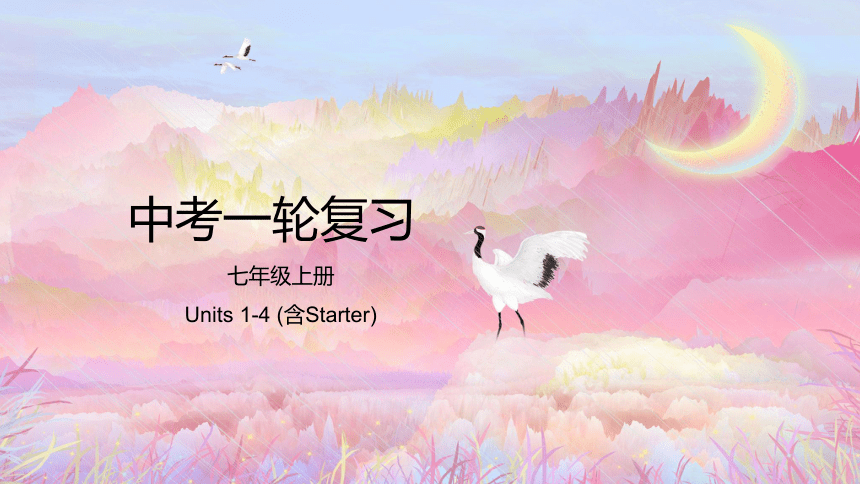
|
|
| 格式 | pptx | ||
| 文件大小 | 6.1MB | ||
| 资源类型 | 教案 | ||
| 版本资源 | 人教新目标(Go for it)版 | ||
| 科目 | 英语 | ||
| 更新时间 | 2022-03-20 00:00:00 | ||
图片预览

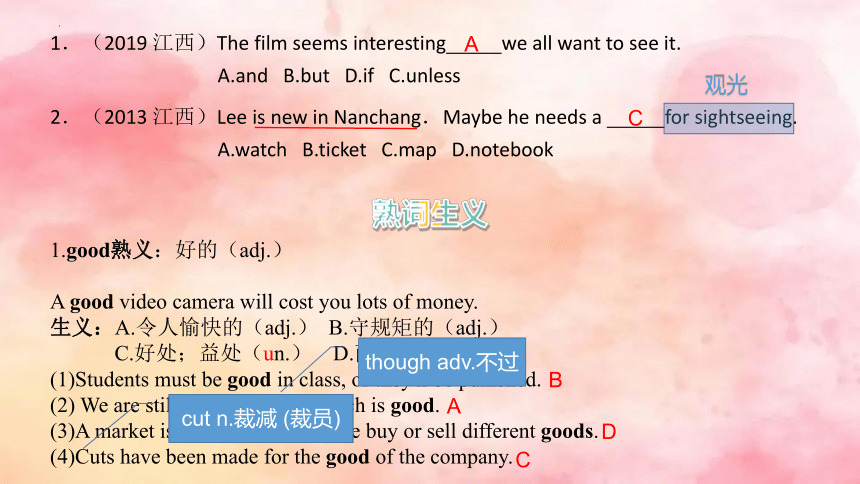
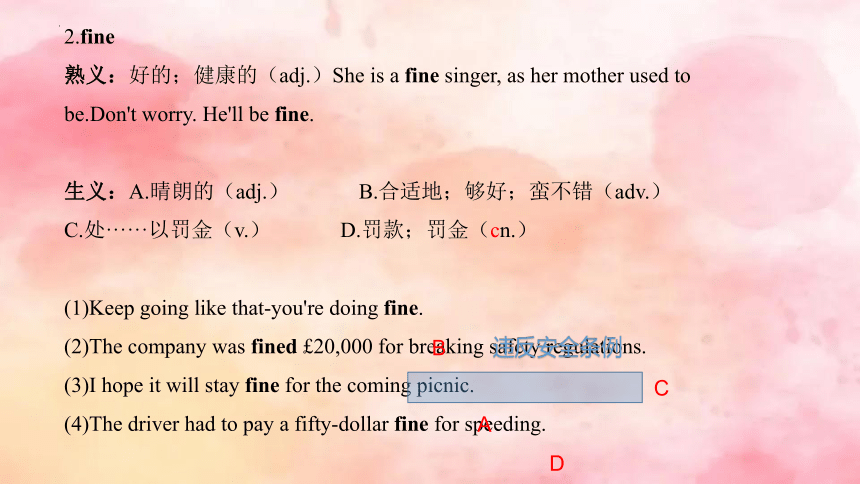
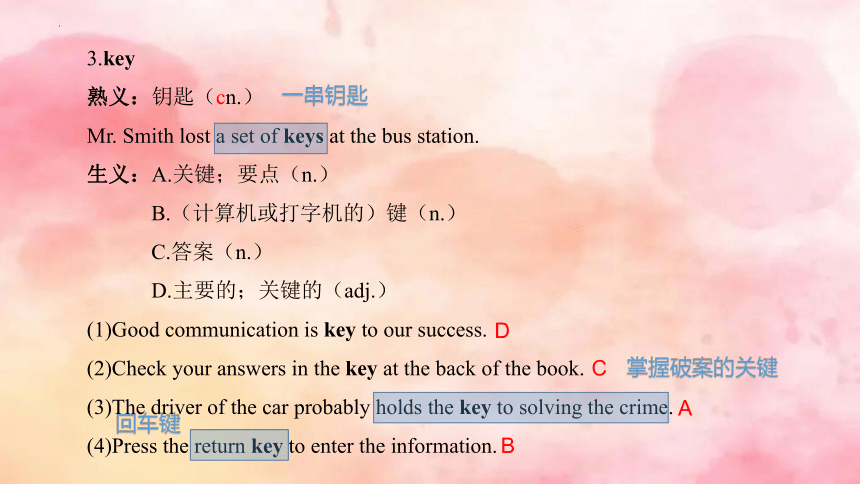
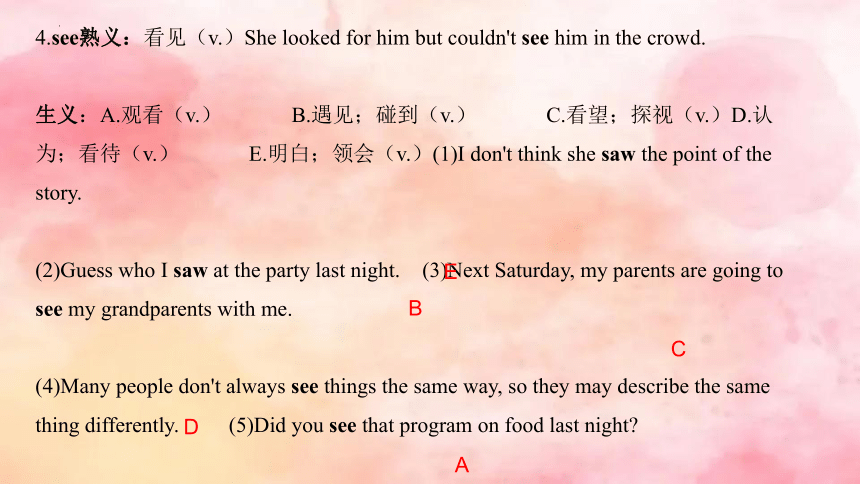
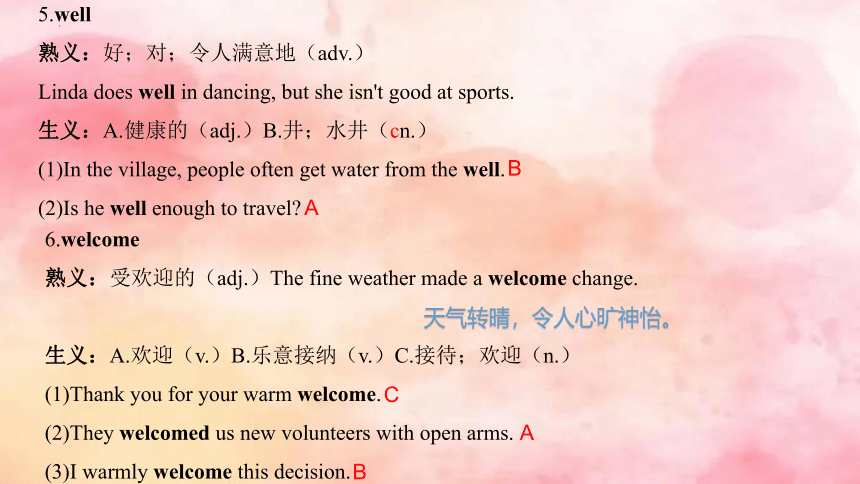
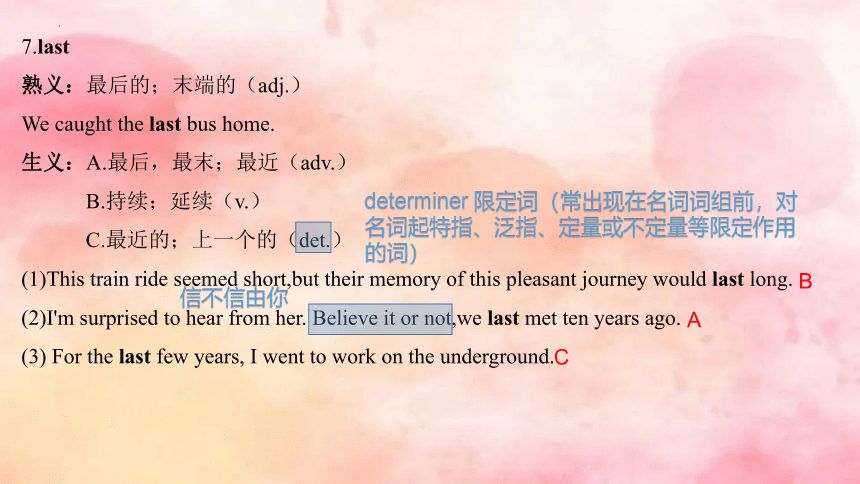
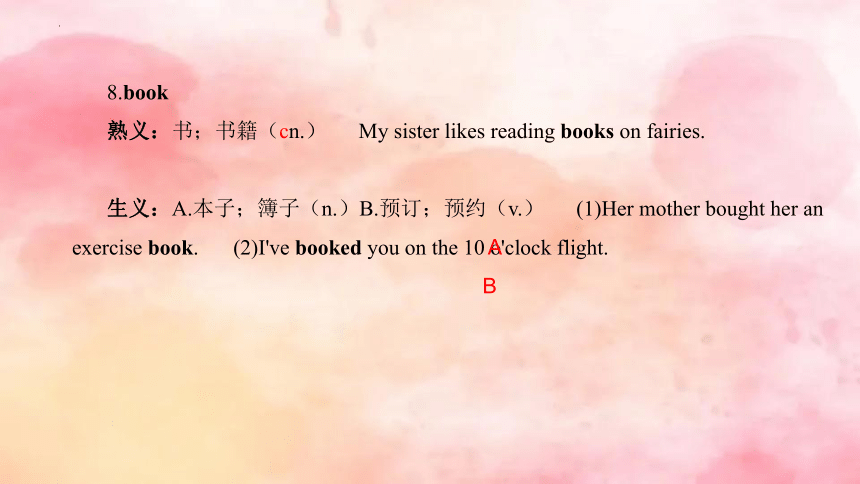
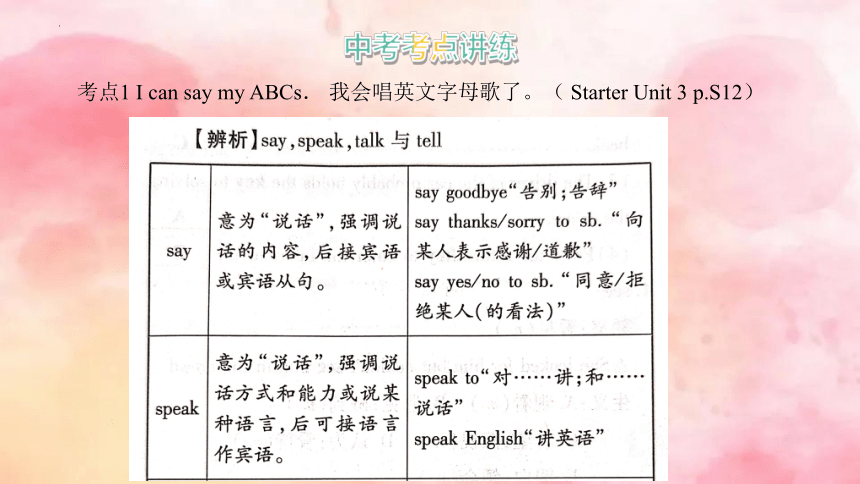
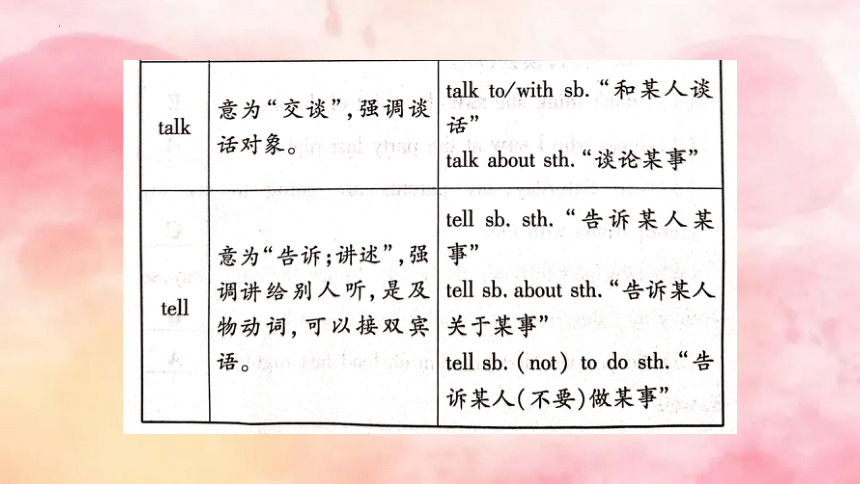
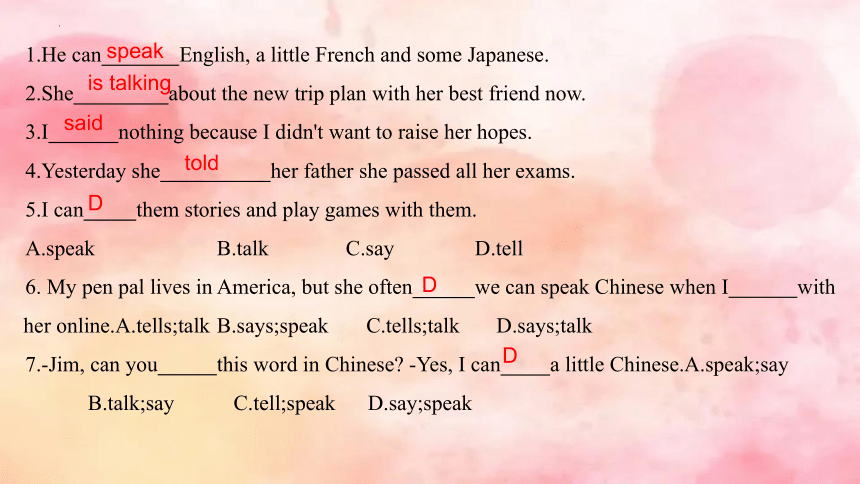
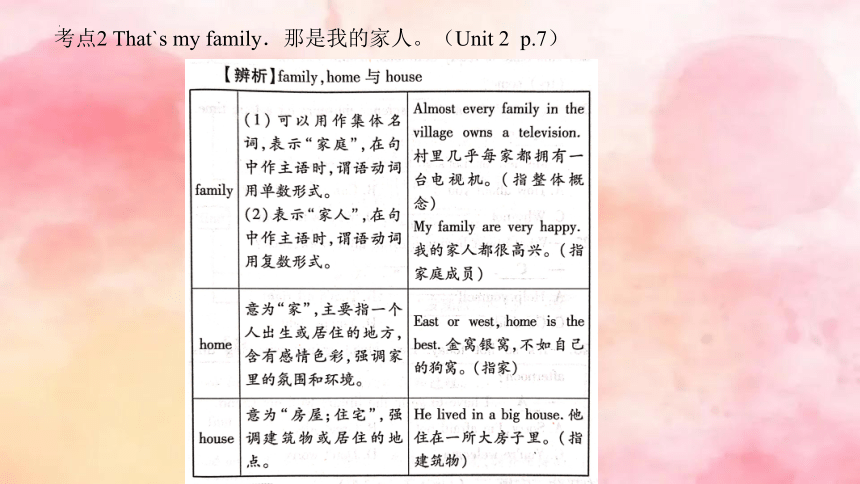
文档简介
(共48张PPT)
中考一轮复习
七年级上册
Units 1-4 (含Starter)
1.(2019 江西)The film seems interesting we all want to see it.
A.and B.but D.if C.unless
2.(2013 江西)Lee is new in Nanchang.Maybe he needs a for sightseeing.
A.watch B.ticket C.map D.notebook
C
A
观光
熟词生义
1.good熟义:好的(adj.)
A good video camera will cost you lots of money.
生义:A.令人愉快的(adj.) B.守规矩的(adj.)
C.好处;益处(un.) D.商品;货品(cn.)
(1)Students must be good in class, or they'll be punished.
(2) We are still friends,though,which is good.
(3)A market is a place where people buy or sell different goods.
(4)Cuts have been made for the good of the company.
B
A
D
C
though adv.不过
cut n.裁减 (裁员)
2.fine
熟义:好的;健康的(adj.)She is a fine singer, as her mother used to be.Don't worry. He'll be fine.
生义:A.晴朗的(adj.) B.合适地;够好;蛮不错(adv.) C.处······以罚金(v.) D.罚款;罚金(cn.)
(1)Keep going like that-you're doing fine.
(2)The company was fined 20,000 for breaking safety regulations.
(3)I hope it will stay fine for the coming picnic.
(4)The driver had to pay a fifty-dollar fine for speeding.
B
C
A
D
违反安全条例
3.key
熟义:钥匙(cn.)
Mr. Smith lost a set of keys at the bus station.
生义:A.关键;要点(n.)
B.(计算机或打字机的)键(n.)
C.答案(n.)
D.主要的;关键的(adj.)
(1)Good communication is key to our success.
(2)Check your answers in the key at the back of the book.
(3)The driver of the car probably holds the key to solving the crime.
(4)Press the return key to enter the information.
D
C
A
B
一串钥匙
掌握破案的关键
回车键
4.see熟义:看见(v.)She looked for him but couldn't see him in the crowd.
生义:A.观看(v.) B.遇见;碰到(v.) C.看望;探视(v.)D.认为;看待(v.) E.明白;领会(v.)(1)I don't think she saw the point of the story.
(2)Guess who I saw at the party last night. (3)Next Saturday, my parents are going to see my grandparents with me.
(4)Many people don't always see things the same way, so they may describe the same thing differently. (5)Did you see that program on food last night
E
B
C
D
A
5.well
熟义:好;对;令人满意地(adv.)
Linda does well in dancing, but she isn't good at sports.
生义:A.健康的(adj.)B.井;水井(cn.)
(1)In the village, people often get water from the well.
(2)Is he well enough to travel
B
A
6.welcome
熟义:受欢迎的(adj.)The fine weather made a welcome change.
生义:A.欢迎(v.)B.乐意接纳(v.)C.接待;欢迎(n.)
(1)Thank you for your warm welcome.
(2)They welcomed us new volunteers with open arms.
(3)I warmly welcome this decision.
C
A
B
天气转晴,令人心旷神怡。
7.last
熟义:最后的;末端的(adj.)
We caught the last bus home.
生义:A.最后,最末;最近(adv.)
B.持续;延续(v.)
C.最近的;上一个的(det.)
(1)This train ride seemed short,but their memory of this pleasant journey would last long.
(2)I'm surprised to hear from her. Believe it or not,we last met ten years ago.
(3) For the last few years, I went to work on the underground.
B
A
C
determiner 限定词(常出现在名词词组前,对名词起特指、泛指、定量或不定量等限定作用的词)
信不信由你
8.book
熟义:书;书籍(cn.) My sister likes reading books on fairies.
生义:A.本子;簿子(n.)B.预订;预约(v.) (1)Her mother bought her an exercise book. (2)I've booked you on the 10 o'clock flight.
A
B
中考考点讲练
考点1 I can say my ABCs. 我会唱英文字母歌了。( Starter Unit 3 p.S12)
1.He can English, a little French and some Japanese.
2.She about the new trip plan with her best friend now.
3.I nothing because I didn't want to raise her hopes.
4.Yesterday she her father she passed all her exams.
5.I can them stories and play games with them.
A.speak B.talk C.say D.tell
6. My pen pal lives in America, but she often we can speak Chinese when I with her online.A.tells;talk B.says;speak C.tells;talk D.says;talk
7.-Jim, can you this word in Chinese -Yes, I can a little Chinese.A.speak;say B.talk;say C.tell;speak D.say;speak
speak
D
D
D
told
said
is talking
考点2 That`s my family.那是我的家人。(Unit 2 p.7)
8.The increasing prices of the have become a hot topic for many years.
9.I am from a of six people.10.They often get back from work very late.
11. The little boy is from a teacher's_ .
12.Look! There are many new in our village.
13.Sally considers Wuhan to be her second because she has lived here for 13 years.
A.family B.house C.home D.room
14. She was born in America, but she has made China her .
A.family B.house C.home D.address
house
family
home
family
houses
C
C
考点3 Well,have a good day!那好,愿你们(一天)过得愉快!(Unit 2 p.8)
fine也可以用来指人的品行、事物的质地特别出色。
15.The apples look and sell in the fruit shop.
16.Tomorrow will be . Shall we have a picnic
17.You don't look , Amy! You'd better see a doctor.
18.It's very of you to help me.
19.He sings and he is a singer.
A.good;good B.well;well C.good;well D.well;good
20.-Your picture is very .
-Thank you.
A.good B.bad C.fine D.well
21.Look! The flowers in the garden are very .
A.good B.nice C.fine D.well
good
well
fine
well
nice
D
A
B
考点4 What about this dictionary?这本字典怎么样?(Unit3 p.14)
“What about...?”表示“怎么样?”,相当于“How about...?”。about后接名词、代词或动名词。具体用法如下:(1)询问情况或打听消息。I like watching action movies. What/How about you
我喜欢看动作片。你呢?
(2)征求对方看法或意见,相当于句型“Would you like...?”,语气更委婉。
What/How about playing tennis this afternoon = Would you like to play tennis this afternoon?今天下午去 打网球怎么样?
(3)常用的肯定答语为“OK!/All right./Goodidea./I think so.”等,否定答语为“Sorry,I.../I'm afraidnot.”等。
22.What about (go) to the beach for vacation, Jenny
23.-Look,Kangkang! That old man is crossing the crosswalk. -Jane,let's (help) him.
24.It's raining outside.Why not (take) an umbrella
25.This cake is really delicious. Would you like (try)some
26.-I haven't been to the science museum for a long time.
-Me neither. Let's go there this weekend.
A.How about you B.Can you help me C.Why not D. What's it about
27.-What about having a drink after work, Jack
- .
A.Help yourself B.That's all right C.Good idea D.You're right
going
help
take
to try
A
C
28.-It's so hot today. How about going swimming this afternoon
.I have to go to the library with my friend.
A.Sorry, I'm afraid not B.Great idea C.You're welcome D.Don't worry
A
考点5 Thank you for your help, Anna.感谢你的帮助,安娜。(Unit 3 p.14)
help的常见用法如下:
29. Bob couldn't help _ _ (jump) when he heard the news that he had passed the exam.
30.Mrs. Lee put some cakes on the table and asked me to help .A.myself B.mine C.my D.me
31. the help of my teacher, I have made great progress in English.
A.From B.With C.In D.On
32.I often help my parents the housework on weekends.
A.at B.to C.for D.with
jumping
A
B
D
考点6 Ask the teacher for it. 去老师那里拿(它)。(Unit 3 p.17)
ask的常见用法如下:
33.The teacher asked Lisa how many students would take part in the competition.
A. check B. checking C. to check D. checked
34. The police are the best choice for people to ask help when they are in danger.
A.for B.to C.at D.in
35.It's impolite to ask others their personal information.
A.in B.about C.with D.at
C
A
B
考点7 must find it.我必须找到它。 (Unit 3 p.17)
find的用法如下:
【辨析】look for,find 与 find out
look for 意为“寻找”,强调动作和过程。
find 意为“找到;发现”,强调结果。
find out 意为“查出;获知”,强调经过研究、调查而得知。
36.Although he finds it hard Chinese well, he still studies very hard after school.
A.learn B.to learn C. learning D. to learning
37.Mr.Liu found Li Hong was absent from the class. But he didn't know why.
A. that B. what C. where D. which
38.-What happened
-Well,I found some boys in the reading room when I passed by.
A. play cards B. to play cards C. playing cards D. plays cards
39.-What are you doing, Jack
-I'm my math book, but I can't it.
A. looking at; find B. looking for; find C. finding; look for D. finding; find out
B
A
B
C
一、用方框中所给词的适当形式填空
1.The weather is quite and the scenery is very beautiful.
2.Be quiet.I have something .
3.On Mother's Day,my mother was happy because I gave a scarf as a present.
4.I like playing basketball very much and I want to be a basketball_ in the future.
5. Work hard, you will make great progress.
6.Some of the in the store are from the US.
7.How about_ Mr.Li about the problem
8.Millions of have trouble in communication.
9.Cindy her pet dog and she was,so sad.
10.-I left my math book at home,Linda. Can I use -Sure,here you are.
find, ask, you, play, she, watch, and, lose, family
fine
to say
her
player
and
watches
asking
families
lost
yours
二、单项填空
11.-I have uncle and aunt.
A. an; a B. a; an C. an; an D. a; a
12.- is she
-She is Grace's aunt.
A. Who B. What C. How D.Where
13.That is a photo Tom's family.
A. in B. on C. of D. at
14. After working for two hours, they asked their boss half an hour's break.
A. of B. with C. about D. for
15. Our teacher often tells us time.
A. not waste B. don`t waste C. not to waste D. doesn`t waste
C
A
C
D
C
16.-Is this your ruler
-Yes,it's .
A. my B. mine C. me D. I
17.Some keys are in Classroom 7E. Are they yours Ms.Miller at 868-5437.
A. Call B.Meet C.Have D.Let
18. We all need . When we are in trouble, they are always there and ready to help us.
A. books B. time C. friends D. money
C
A
B
1. look “看”,强调看的动作,为不及物动词。表示“看……”后加at。
Look! The bus is coming. 看!公交车来了。
Please look at the blackboard. 请看黑板。
2. watch 侧重“观看”,强调看活动的非静止的画面。
watch TV 看电视 watch a match 看球赛
3. see “看见;看到”,强调看的结果。
What can you see in the picture 在这幅图画中,你看到了什么?
4. read “阅读”,指看有文字内容的东西。
read a book 看书 read a newspaper 看报纸
look, watch, see与read
考点聚焦
see的用法
see sb. do sth. 表示看到某人做某事了,强调已经完成的事情,或者表述客观事实。如:
I saw her do the homework.( 强调做过这件事,表述客观事实)
see sb. doing sth. 表示看到某人正在做某事,强调正在进行或当前发生的事情。如:
I saw her reading the book.
我看到她正在读书。(强调正在进行的事情)
too, also, either与as well
1. also,too和either三者都是“也”的意思。also, too 用于肯定句,其中also用于句中,too用于句末,且前面有逗号;either用于否定句,且前面有逗号。
2. as well常用作状语,作“又;也”,相当于too或also,常位于句末,无须用逗号与句子分开。
too
作副词,意为“太”时,修饰形容词或副词原级,在句中作状语。
He is too heavy.他太胖了。(修饰形容词)
The teacher teaches us English too patiently. (修饰副词)
这位老师耐心地教我们英语。
either
1. either 用作代词时,意为“两者中的任何一个”,在句中可作主语和宾语。either 在句中用作主语时,谓语动词应为单数形式。如:
—Do you like the two books 你喜欢这两本书吗
—No, I don’t like either. 不,哪一本我都不喜欢。
Either of the students does well in their studies. 两个学生中,无论是谁学习都不错。
2. either 用作形容词时,意为“两者中任何一个的”“两边中任何一边的”,作前置定语用。如:
He saw two films, but he didn’t like either one very much.
他看了两部电影,但哪一部他也不太喜欢。
On either side of the river there are some small factories.
在河的两边都有几座小型的工厂。
There are a lot of trees on either side of the street.
街道的两边都有许多树。
room
作为不可数名词时,意为“空间”。固定搭配:make room for sb. “给某人让空”如:
Please step aside a little to make room for me.
请稍站过去一点,让我插个脚。
excuse me
常用于事先表示歉意,引出可能使对方不高兴的话或事。
excuse me, pardon和sorry
(1) 表达请求原谅(过失)等
Excuse me for being late. 请原谅,我来晚了。
(2) 在想打搅他人,想说不赞成或不同意他人意见的话时
Excuse me, could I sit here 打搅一下,我可以坐在这儿吗?
pardon
作动词意为“原谅”;作感叹词,意为“请再说一遍”。
(1)在没有听清对方说的话,请求重复时
Pardon 请再说一遍好吗?
(2)在做错事时表示歉意
I beg your pardon; I didn't mean to take your umbrella.对不起,我不是故意拿错你的伞的。
sorry
常用于事后表示道歉。与excuse me不同,是事后说的表示歉意的。
(1)表示适度的遗憾或歉意
Oh, sorry, did I stand in your light
啊,对不起,我挡你的光线了吧?
(2) 表示难过、惋惜
We are sorry to hear that he has been seriously ill.
听说他病得很严重,我们很难过。
(3)用于对刚说的话或刚做的事表示歉意
I'm sorry to have talked back to you.
对不起,我刚才不该顶撞你。
(龙东中考)
—When shall we go to the movies, this afternoon or tomorrow morning
— is OK. I’m free these days.
A. Either B. Neither C. Both
解析:考查不定代词用法。句意:—我们什么时候去看电影呢,今天下午还是明天早晨?—都行,我这几天都有空。由“I’m free these days.”可知,这几天很空闲,所以今天下午和明天早上任何一个时间都可以。
答案: A
强化训练
(湘西中考)
—Hi, good morning. My name is Tim. This is my first time to be here.
—_______.
A. It’s all right B. Nice to meet you C. That would be very nice
强化训练
解析:考查情景交际。句意:—嗨,上午好。我叫吉姆。这是我第一次到这儿来。—见到你很高兴。初次见面问候语用Nice to meet you。
答案: B
(眉山中考)
We find_____ impossible for us_____ a foreign language well in a short time.
A. one;learn B. it;to learn
C. that;to learn D. this;learning
解析:考查固定句式。 句意:我们发现,要在短时间内学好一门外语对于我们来说是不可能的。find it +形容词(for sb.)+to do sth.中的it作形式宾语,动词不定式为真正的宾语。
答案: B
强化训练
(无锡中考)
The only way to do great work is to love what you do. If you _______________ (not find) it yet, keep looking.
haven’t found
解析: 考查动词的时态。句意:做大事的唯一方法就是爱你所做的。如果你还没找到,继续找。yet“还;仍然”是现在完成时的标志词。主语是you,助动词用have。
答案: haven’t found
强化训练
(徐州中考)
As an engineer, you can't be______ careful. You should pay attention to every detail.
A. very B. too C. so D. quite
解析:考查副词辨析。根据句意:作为一名工程师,你再细心也不为过。你应该注意每一个细节。can’t 与too, too much, enough等搭配表示“无论怎样......都不过分” 。
答案: B
强化训练
中考一轮复习
七年级上册
Units 1-4 (含Starter)
1.(2019 江西)The film seems interesting we all want to see it.
A.and B.but D.if C.unless
2.(2013 江西)Lee is new in Nanchang.Maybe he needs a for sightseeing.
A.watch B.ticket C.map D.notebook
C
A
观光
熟词生义
1.good熟义:好的(adj.)
A good video camera will cost you lots of money.
生义:A.令人愉快的(adj.) B.守规矩的(adj.)
C.好处;益处(un.) D.商品;货品(cn.)
(1)Students must be good in class, or they'll be punished.
(2) We are still friends,though,which is good.
(3)A market is a place where people buy or sell different goods.
(4)Cuts have been made for the good of the company.
B
A
D
C
though adv.不过
cut n.裁减 (裁员)
2.fine
熟义:好的;健康的(adj.)She is a fine singer, as her mother used to be.Don't worry. He'll be fine.
生义:A.晴朗的(adj.) B.合适地;够好;蛮不错(adv.) C.处······以罚金(v.) D.罚款;罚金(cn.)
(1)Keep going like that-you're doing fine.
(2)The company was fined 20,000 for breaking safety regulations.
(3)I hope it will stay fine for the coming picnic.
(4)The driver had to pay a fifty-dollar fine for speeding.
B
C
A
D
违反安全条例
3.key
熟义:钥匙(cn.)
Mr. Smith lost a set of keys at the bus station.
生义:A.关键;要点(n.)
B.(计算机或打字机的)键(n.)
C.答案(n.)
D.主要的;关键的(adj.)
(1)Good communication is key to our success.
(2)Check your answers in the key at the back of the book.
(3)The driver of the car probably holds the key to solving the crime.
(4)Press the return key to enter the information.
D
C
A
B
一串钥匙
掌握破案的关键
回车键
4.see熟义:看见(v.)She looked for him but couldn't see him in the crowd.
生义:A.观看(v.) B.遇见;碰到(v.) C.看望;探视(v.)D.认为;看待(v.) E.明白;领会(v.)(1)I don't think she saw the point of the story.
(2)Guess who I saw at the party last night. (3)Next Saturday, my parents are going to see my grandparents with me.
(4)Many people don't always see things the same way, so they may describe the same thing differently. (5)Did you see that program on food last night
E
B
C
D
A
5.well
熟义:好;对;令人满意地(adv.)
Linda does well in dancing, but she isn't good at sports.
生义:A.健康的(adj.)B.井;水井(cn.)
(1)In the village, people often get water from the well.
(2)Is he well enough to travel
B
A
6.welcome
熟义:受欢迎的(adj.)The fine weather made a welcome change.
生义:A.欢迎(v.)B.乐意接纳(v.)C.接待;欢迎(n.)
(1)Thank you for your warm welcome.
(2)They welcomed us new volunteers with open arms.
(3)I warmly welcome this decision.
C
A
B
天气转晴,令人心旷神怡。
7.last
熟义:最后的;末端的(adj.)
We caught the last bus home.
生义:A.最后,最末;最近(adv.)
B.持续;延续(v.)
C.最近的;上一个的(det.)
(1)This train ride seemed short,but their memory of this pleasant journey would last long.
(2)I'm surprised to hear from her. Believe it or not,we last met ten years ago.
(3) For the last few years, I went to work on the underground.
B
A
C
determiner 限定词(常出现在名词词组前,对名词起特指、泛指、定量或不定量等限定作用的词)
信不信由你
8.book
熟义:书;书籍(cn.) My sister likes reading books on fairies.
生义:A.本子;簿子(n.)B.预订;预约(v.) (1)Her mother bought her an exercise book. (2)I've booked you on the 10 o'clock flight.
A
B
中考考点讲练
考点1 I can say my ABCs. 我会唱英文字母歌了。( Starter Unit 3 p.S12)
1.He can English, a little French and some Japanese.
2.She about the new trip plan with her best friend now.
3.I nothing because I didn't want to raise her hopes.
4.Yesterday she her father she passed all her exams.
5.I can them stories and play games with them.
A.speak B.talk C.say D.tell
6. My pen pal lives in America, but she often we can speak Chinese when I with her online.A.tells;talk B.says;speak C.tells;talk D.says;talk
7.-Jim, can you this word in Chinese -Yes, I can a little Chinese.A.speak;say B.talk;say C.tell;speak D.say;speak
speak
D
D
D
told
said
is talking
考点2 That`s my family.那是我的家人。(Unit 2 p.7)
8.The increasing prices of the have become a hot topic for many years.
9.I am from a of six people.10.They often get back from work very late.
11. The little boy is from a teacher's_ .
12.Look! There are many new in our village.
13.Sally considers Wuhan to be her second because she has lived here for 13 years.
A.family B.house C.home D.room
14. She was born in America, but she has made China her .
A.family B.house C.home D.address
house
family
home
family
houses
C
C
考点3 Well,have a good day!那好,愿你们(一天)过得愉快!(Unit 2 p.8)
fine也可以用来指人的品行、事物的质地特别出色。
15.The apples look and sell in the fruit shop.
16.Tomorrow will be . Shall we have a picnic
17.You don't look , Amy! You'd better see a doctor.
18.It's very of you to help me.
19.He sings and he is a singer.
A.good;good B.well;well C.good;well D.well;good
20.-Your picture is very .
-Thank you.
A.good B.bad C.fine D.well
21.Look! The flowers in the garden are very .
A.good B.nice C.fine D.well
good
well
fine
well
nice
D
A
B
考点4 What about this dictionary?这本字典怎么样?(Unit3 p.14)
“What about...?”表示“怎么样?”,相当于“How about...?”。about后接名词、代词或动名词。具体用法如下:(1)询问情况或打听消息。I like watching action movies. What/How about you
我喜欢看动作片。你呢?
(2)征求对方看法或意见,相当于句型“Would you like...?”,语气更委婉。
What/How about playing tennis this afternoon = Would you like to play tennis this afternoon?今天下午去 打网球怎么样?
(3)常用的肯定答语为“OK!/All right./Goodidea./I think so.”等,否定答语为“Sorry,I.../I'm afraidnot.”等。
22.What about (go) to the beach for vacation, Jenny
23.-Look,Kangkang! That old man is crossing the crosswalk. -Jane,let's (help) him.
24.It's raining outside.Why not (take) an umbrella
25.This cake is really delicious. Would you like (try)some
26.-I haven't been to the science museum for a long time.
-Me neither. Let's go there this weekend.
A.How about you B.Can you help me C.Why not D. What's it about
27.-What about having a drink after work, Jack
- .
A.Help yourself B.That's all right C.Good idea D.You're right
going
help
take
to try
A
C
28.-It's so hot today. How about going swimming this afternoon
.I have to go to the library with my friend.
A.Sorry, I'm afraid not B.Great idea C.You're welcome D.Don't worry
A
考点5 Thank you for your help, Anna.感谢你的帮助,安娜。(Unit 3 p.14)
help的常见用法如下:
29. Bob couldn't help _ _ (jump) when he heard the news that he had passed the exam.
30.Mrs. Lee put some cakes on the table and asked me to help .A.myself B.mine C.my D.me
31. the help of my teacher, I have made great progress in English.
A.From B.With C.In D.On
32.I often help my parents the housework on weekends.
A.at B.to C.for D.with
jumping
A
B
D
考点6 Ask the teacher for it. 去老师那里拿(它)。(Unit 3 p.17)
ask的常见用法如下:
33.The teacher asked Lisa how many students would take part in the competition.
A. check B. checking C. to check D. checked
34. The police are the best choice for people to ask help when they are in danger.
A.for B.to C.at D.in
35.It's impolite to ask others their personal information.
A.in B.about C.with D.at
C
A
B
考点7 must find it.我必须找到它。 (Unit 3 p.17)
find的用法如下:
【辨析】look for,find 与 find out
look for 意为“寻找”,强调动作和过程。
find 意为“找到;发现”,强调结果。
find out 意为“查出;获知”,强调经过研究、调查而得知。
36.Although he finds it hard Chinese well, he still studies very hard after school.
A.learn B.to learn C. learning D. to learning
37.Mr.Liu found Li Hong was absent from the class. But he didn't know why.
A. that B. what C. where D. which
38.-What happened
-Well,I found some boys in the reading room when I passed by.
A. play cards B. to play cards C. playing cards D. plays cards
39.-What are you doing, Jack
-I'm my math book, but I can't it.
A. looking at; find B. looking for; find C. finding; look for D. finding; find out
B
A
B
C
一、用方框中所给词的适当形式填空
1.The weather is quite and the scenery is very beautiful.
2.Be quiet.I have something .
3.On Mother's Day,my mother was happy because I gave a scarf as a present.
4.I like playing basketball very much and I want to be a basketball_ in the future.
5. Work hard, you will make great progress.
6.Some of the in the store are from the US.
7.How about_ Mr.Li about the problem
8.Millions of have trouble in communication.
9.Cindy her pet dog and she was,so sad.
10.-I left my math book at home,Linda. Can I use -Sure,here you are.
find, ask, you, play, she, watch, and, lose, family
fine
to say
her
player
and
watches
asking
families
lost
yours
二、单项填空
11.-I have uncle and aunt.
A. an; a B. a; an C. an; an D. a; a
12.- is she
-She is Grace's aunt.
A. Who B. What C. How D.Where
13.That is a photo Tom's family.
A. in B. on C. of D. at
14. After working for two hours, they asked their boss half an hour's break.
A. of B. with C. about D. for
15. Our teacher often tells us time.
A. not waste B. don`t waste C. not to waste D. doesn`t waste
C
A
C
D
C
16.-Is this your ruler
-Yes,it's .
A. my B. mine C. me D. I
17.Some keys are in Classroom 7E. Are they yours Ms.Miller at 868-5437.
A. Call B.Meet C.Have D.Let
18. We all need . When we are in trouble, they are always there and ready to help us.
A. books B. time C. friends D. money
C
A
B
1. look “看”,强调看的动作,为不及物动词。表示“看……”后加at。
Look! The bus is coming. 看!公交车来了。
Please look at the blackboard. 请看黑板。
2. watch 侧重“观看”,强调看活动的非静止的画面。
watch TV 看电视 watch a match 看球赛
3. see “看见;看到”,强调看的结果。
What can you see in the picture 在这幅图画中,你看到了什么?
4. read “阅读”,指看有文字内容的东西。
read a book 看书 read a newspaper 看报纸
look, watch, see与read
考点聚焦
see的用法
see sb. do sth. 表示看到某人做某事了,强调已经完成的事情,或者表述客观事实。如:
I saw her do the homework.( 强调做过这件事,表述客观事实)
see sb. doing sth. 表示看到某人正在做某事,强调正在进行或当前发生的事情。如:
I saw her reading the book.
我看到她正在读书。(强调正在进行的事情)
too, also, either与as well
1. also,too和either三者都是“也”的意思。also, too 用于肯定句,其中also用于句中,too用于句末,且前面有逗号;either用于否定句,且前面有逗号。
2. as well常用作状语,作“又;也”,相当于too或also,常位于句末,无须用逗号与句子分开。
too
作副词,意为“太”时,修饰形容词或副词原级,在句中作状语。
He is too heavy.他太胖了。(修饰形容词)
The teacher teaches us English too patiently. (修饰副词)
这位老师耐心地教我们英语。
either
1. either 用作代词时,意为“两者中的任何一个”,在句中可作主语和宾语。either 在句中用作主语时,谓语动词应为单数形式。如:
—Do you like the two books 你喜欢这两本书吗
—No, I don’t like either. 不,哪一本我都不喜欢。
Either of the students does well in their studies. 两个学生中,无论是谁学习都不错。
2. either 用作形容词时,意为“两者中任何一个的”“两边中任何一边的”,作前置定语用。如:
He saw two films, but he didn’t like either one very much.
他看了两部电影,但哪一部他也不太喜欢。
On either side of the river there are some small factories.
在河的两边都有几座小型的工厂。
There are a lot of trees on either side of the street.
街道的两边都有许多树。
room
作为不可数名词时,意为“空间”。固定搭配:make room for sb. “给某人让空”如:
Please step aside a little to make room for me.
请稍站过去一点,让我插个脚。
excuse me
常用于事先表示歉意,引出可能使对方不高兴的话或事。
excuse me, pardon和sorry
(1) 表达请求原谅(过失)等
Excuse me for being late. 请原谅,我来晚了。
(2) 在想打搅他人,想说不赞成或不同意他人意见的话时
Excuse me, could I sit here 打搅一下,我可以坐在这儿吗?
pardon
作动词意为“原谅”;作感叹词,意为“请再说一遍”。
(1)在没有听清对方说的话,请求重复时
Pardon 请再说一遍好吗?
(2)在做错事时表示歉意
I beg your pardon; I didn't mean to take your umbrella.对不起,我不是故意拿错你的伞的。
sorry
常用于事后表示道歉。与excuse me不同,是事后说的表示歉意的。
(1)表示适度的遗憾或歉意
Oh, sorry, did I stand in your light
啊,对不起,我挡你的光线了吧?
(2) 表示难过、惋惜
We are sorry to hear that he has been seriously ill.
听说他病得很严重,我们很难过。
(3)用于对刚说的话或刚做的事表示歉意
I'm sorry to have talked back to you.
对不起,我刚才不该顶撞你。
(龙东中考)
—When shall we go to the movies, this afternoon or tomorrow morning
— is OK. I’m free these days.
A. Either B. Neither C. Both
解析:考查不定代词用法。句意:—我们什么时候去看电影呢,今天下午还是明天早晨?—都行,我这几天都有空。由“I’m free these days.”可知,这几天很空闲,所以今天下午和明天早上任何一个时间都可以。
答案: A
强化训练
(湘西中考)
—Hi, good morning. My name is Tim. This is my first time to be here.
—_______.
A. It’s all right B. Nice to meet you C. That would be very nice
强化训练
解析:考查情景交际。句意:—嗨,上午好。我叫吉姆。这是我第一次到这儿来。—见到你很高兴。初次见面问候语用Nice to meet you。
答案: B
(眉山中考)
We find_____ impossible for us_____ a foreign language well in a short time.
A. one;learn B. it;to learn
C. that;to learn D. this;learning
解析:考查固定句式。 句意:我们发现,要在短时间内学好一门外语对于我们来说是不可能的。find it +形容词(for sb.)+to do sth.中的it作形式宾语,动词不定式为真正的宾语。
答案: B
强化训练
(无锡中考)
The only way to do great work is to love what you do. If you _______________ (not find) it yet, keep looking.
haven’t found
解析: 考查动词的时态。句意:做大事的唯一方法就是爱你所做的。如果你还没找到,继续找。yet“还;仍然”是现在完成时的标志词。主语是you,助动词用have。
答案: haven’t found
强化训练
(徐州中考)
As an engineer, you can't be______ careful. You should pay attention to every detail.
A. very B. too C. so D. quite
解析:考查副词辨析。根据句意:作为一名工程师,你再细心也不为过。你应该注意每一个细节。can’t 与too, too much, enough等搭配表示“无论怎样......都不过分” 。
答案: B
强化训练
